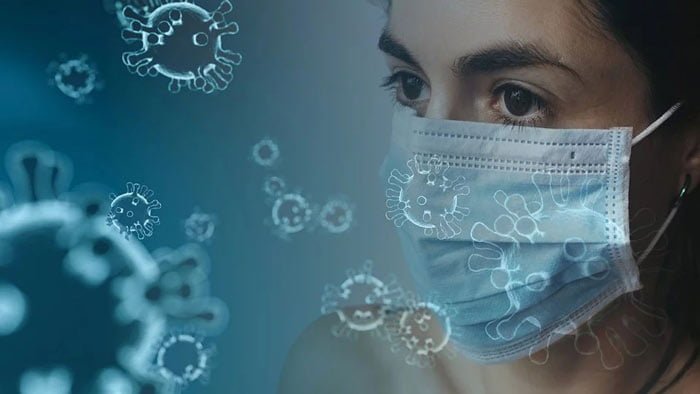CoronaVirus comes in a large family of viruses that can cause respiratory diseases ranging from a minor cold to Middle East Respiratory Syndrome (MERS-CoV) and Severe Acute Respiratory Syndrome (SARS-CoV). Novel coronavirus (nCOV) is a new strain of the family of coronaviruses that have been recently identified in Wuhan, China.
It is a type of virus that is zoonotic which means that it is transmitted between humans and animals. These viruses circulate in animals and have chances of being transmitted to humans through various means. COVID-19 has been stated to be found in rats, snakes, and bats from where it has been transmitted to humans. Since the outbreak of COVID-19 in December 2019 around 80,000 above cases have been reported globally. Till now, there has been no vaccine or treatment available for COVID-19 unlike seasonal influenza/seasonal flu.
How CoronaVirus Spreads?
This virus has been stated to spread from person to person. It can spread between people who are in close contact (within about 6 feet) with each other. Furthermore, it is also transferred through respiratory droplets when a person who is infected with coronavirus coughs and sneezes. These droplets when land in the mouth or noses of the people who are nearby you, they can be transferred to their lungs through inhalation.
Any person who touches or comes in contact with the surface or object that has coronavirus may also get contaminated with the virus if they then touch their nose, mouth, and eyes.
What are the Symptoms of CoronaVirus?
The symptoms of the coronavirus (Covid-19) are very typical and it is difficult to differentiate them from the symptoms of the common flu or influenza. However, the reported symptoms have been said to range from mild to severe illness which has caused deaths because of this virus. According to WHO Here are the following symptoms that appear after 2-14 days of exposure to the virus.
- Fever
- Cough
- Shortness of breath
- Fatigue/Tiredness
- Diarrhea (in extreme cases)
- Breathing difficulties
These are the common symptoms of coronavirus however, in severe cases it can lead to severe pneumonia, failure of multiple organs such as kidney failure, liver failure, impaired kidney function, extreme cough, and death.
How Quickly Do Symptoms Emerge?
The symptoms of COVID-19 emerge between 2 to 14 days after contracting the virus. However, the time period may vary from person to person. Around 80% of people recover from the disease depending on their immune system through treatment. Whereas the rest of the 20% have the chance of getting severely ill which can cause serious health issues and may even lead to death if not treated.
People who are old in age with multiple health issues like heart diseases, diabetes, or lung problems, infants, children, or adults who are already sick and have low immunity have higher chances of getting infected with CoronaVirus.
6 Steps to Prevent COVID-19
It has always been said that prevention is better than cure. Hence, in order to prevent yourself from getting infected with the coronavirus, the following steps can be taken:
-
Clean Your Hands Often:
- The key to prevention is to keep yourself clean and germ-free. It is stated that one should wash their hands more frequently for about 20 seconds specifically after a visit to any public place, blowing your nose, coughing, and sneezing.
- If water or soap is not available, as an alternative you can use hand sanitizer that consists of at least 60% of alcohol. Cover all the surfaces of your hand and rub your hands together until they feel dry.
- Avoid touching your eyes, nose, and mouth with unwashed hands.
-
Avoid Close Contact
- Do not get very close to people who are already sick. Maintain a safe distance of at least 3 feet.
- Since, COVID-19 can be spread from being to other humans, try to maintain a safe distance between you and other people to avoid transmission of the virus. This is particularly very important for people who have low immunity or have higher chances of getting sick.
-
Stay Home
- If you are already sick, try to stay indoors or at home as you have low immunity and there are chances of other people getting sick too
-
Cover Coughs & Sneezes
- Cover your mouth and nose with a tissue when you are coughing and sneezing. You may also use the inside of your elbow for this purpose.
- Do not keep the used tissues with you. Throw the used tissues in the trash immediately after using them.
- Immediately wash your hands or use a sanitizer after coughing, sneezing, and blowing your nose.
-
Wear a Face Mask
- If you are sick, you should wear a face mask when you are around other people or while entering a medical facility. If you are not able to wear a mask then you should cover your coughs and sneezes. Furthermore, people are who around a sick person should also wear a mask to prevent getting infected.
- If you are not sick then you do not require a mask, however, if you are taking care of someone who is sick then you need to wear a mask.
-
Clean & Dis-infect
- It is necessary to clean and disinfect the surfaces that are being touched or used very frequently.
- If you find any surface dirty, clean it before using it.
- It is always a good idea to use a disinfectant such as alcohol solutions, diluted household bleach, or any other EPA-registered household disinfectant.
How To Protect Yourself?
- Seek early medical help by phone if you have a fever, cough, and breathing issues. Also, share your travel history with the healthcare provider.
- Clean your hands with water and soap or you can also sanitize your hands frequently.
- If you have recently or in the last 14 days traveled from China, Korea, Iran, or any other countries with a widespread outbreak of COVID-19, then you should stay indoors and avoid going to school, the office, or in any other public area.
- If you have traveled from a country that has an outbreak of COVID-19 and you are showing symptoms of coronavirus such as high fever, coughing, runny nose, and sore throat, then do not leave your house until you have been given a piece of advice by your medical provider.
What Should You Do If You Are Sick?
-
Stay Home Except To Get Medical Care
- If you are detected with COVID-19, you should stay at home. Avoid all outdoor activities, except for getting the medical care
- Avoid public areas and transportation
-
Separate Yourself From Other People
- Try to stay away from people as much as possible. Even if one has to interact, make sure that there is a safe distance of about (3-6 feet) between you and the other person in the house.
- Furthermore, it is better and safe to avoid interaction with animals and pets. Officially, there are no reported cases of animals or pets getting infected with COVID-19, however, for your own and others’ safety, limit your contact with pets.
-
Wear a Face Mask
- It is recommended that if you are sick you should wear a mask specifically when interacting with others or your healthcare provider.
- Similarly, if you are caring for others who are sick, it is recommended to wear a mask to avoid any germs and viruses entering your system.
-
Cover Your Coughs & Sneezes
- It is suggested as a preventative measure to cover your coughs and sneezes with tissue paper to avoid the virus being transmitted to others.
-
Call Your Doctor
- If you suspect or believe that there are symptoms of Coronavirus, do not delay your visit to the healthcare provider. Immediately visit any urgent care center around you.
COVID-19 FAQs
-
Can someone who has COVID-19 and is quarantined spread the virus to others?
No. Someone who has completed the quarantined period for coronavirus will not be at risk of spreading the virus to other people. For COVID-19, the quarantine period is about 14 days from the last date of exposure as this is the longest period for coronaviruses.
-
Can the virus be spread through food, frozen food, and refrigerators?
It has been observed that CoronaVirus spreads from person to person via respiratory droplets. Presently there has been no supportive evidence of CoronaVirus being transmitted via food, frozen food, or refrigerators. However, it is an important preventative measure to wash your hands at least for 20 seconds before preparing or cooking refrigerated food.
-
Do high temperatures or the summer season can stop the outbreak of CoronaVirus?
There has been no provident evidence of the impact of weather and temperature on the coronavirus. Although there are certain viruses that are more prevalent during cold weather like influenza and flu. There is still research going on about COVID-19, hence, there is no specific evidence of high temperatures with control of the outbreak of Corona Virus.
-
Has CoronaVirus spread in the United States?
Yes, there have been reported cases of Corona Virus in the United States, however, as the situation has been changing rapidly, one can remain updated via the official website of WHO.
-
If I feel sick should I get tested for CoronaVirus?
If you are going through prolonged symptoms of cough, fever, and breathing issues and have also been in close contact with someone who has Corona Virus, then you must immediately go to a medical provider to get yourself checked. Specifically, people in their old age, children, or one with low immunity should immediately call their medical provider or visit the nearby medical clinic to get themselves tested and checked for COVID-19.
-
Is it possible that a person gets negatively tested for COVID-19 and then gets positively tested?
There is a possibility that in the early stages of its development, the virus might not get detected and the test results might be negative. However, if the person seems to show persistent symptoms of COVID-19, the person might get positive results for it in later stages.
Is CoronaVirus Worse Than Normal Influenza?
Since coronavirus is new and there is very less or little research being done about it, hence it is going to be difficult to assess at the moment about how dangerous it is. However, the seasonal flu or influenza is stated to have a mortality rate below 1%.
The most critical difference between normal influenza and coronavirus is that COVID-19 does not have any vaccine developed till now. Hence, it is more likely to spread and members of the population are more vulnerable to catching it, specifically older people who have low immunity and respiratory issues. The important part is that people who are unwell should take more care of their hygiene and wash their hands more often.
What is the current situation of CoronaVirus?
Corona Virus originated in Wuhan city of China in late December 2019.



